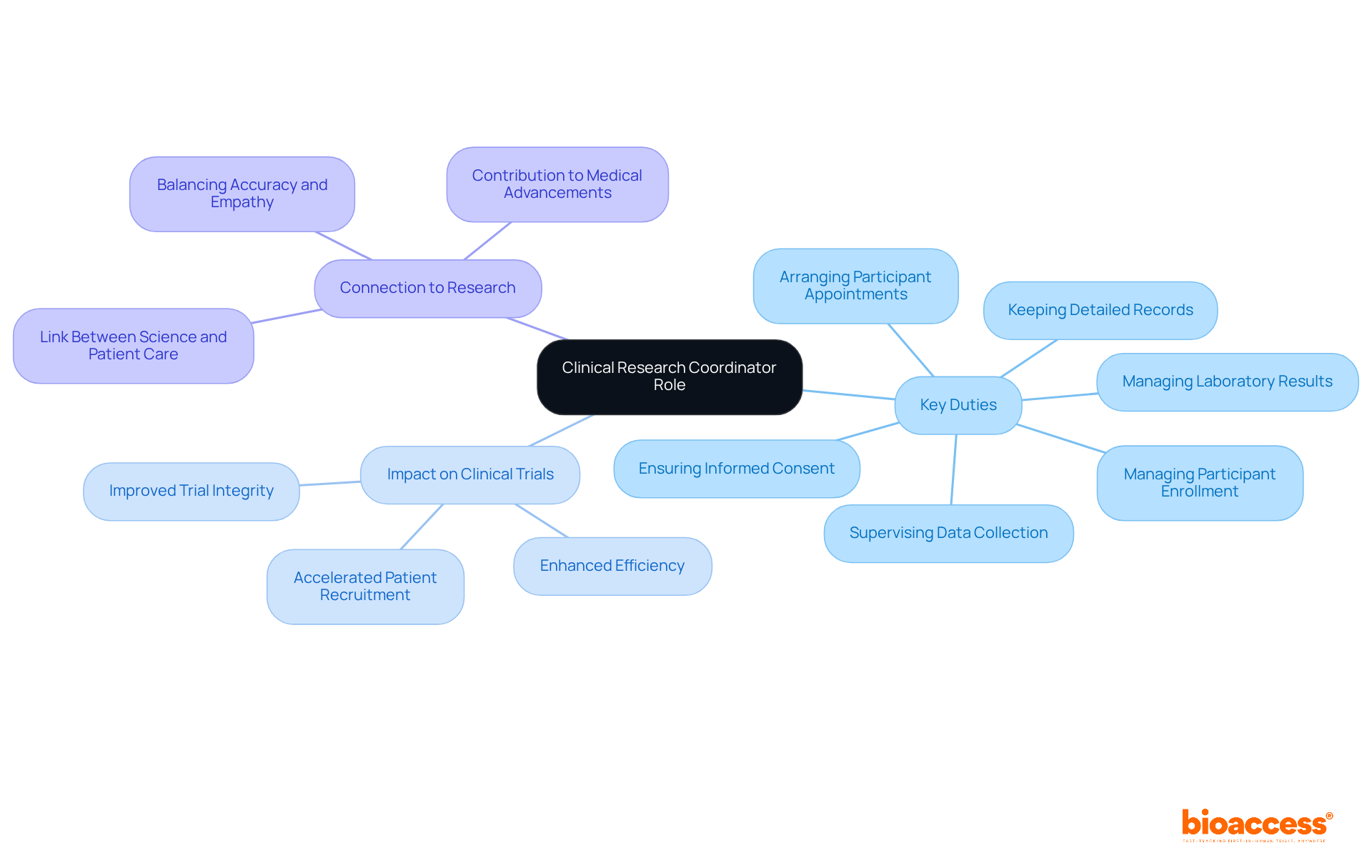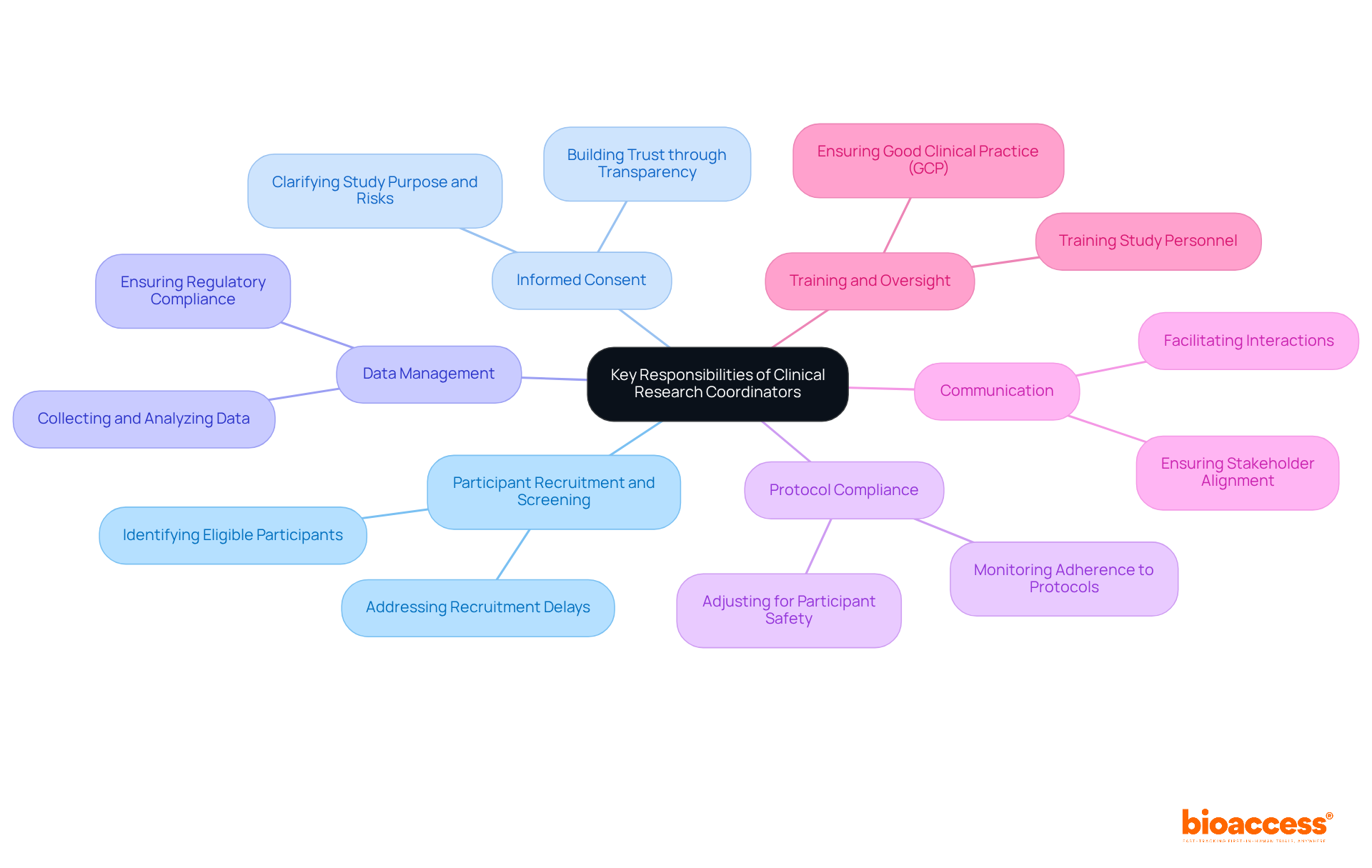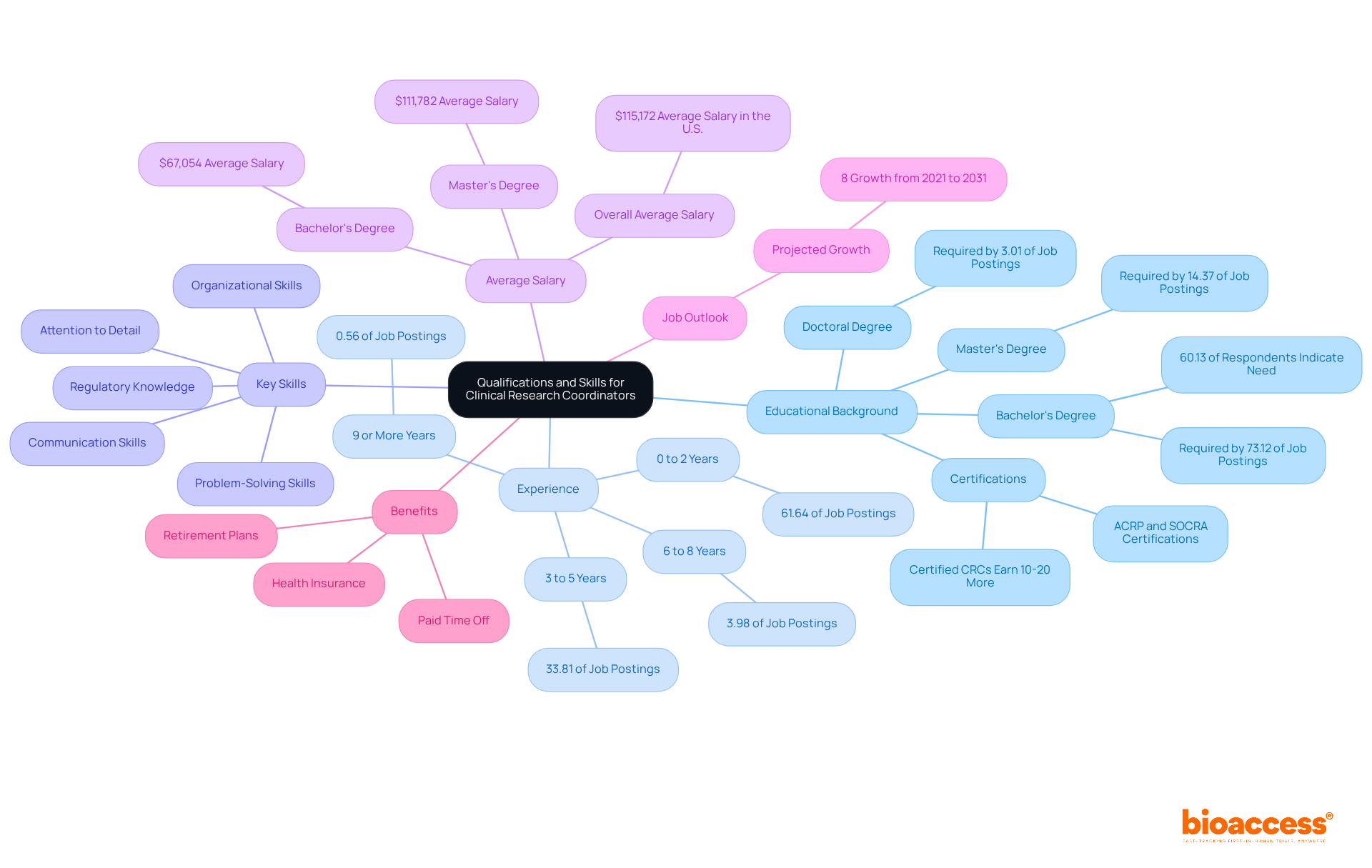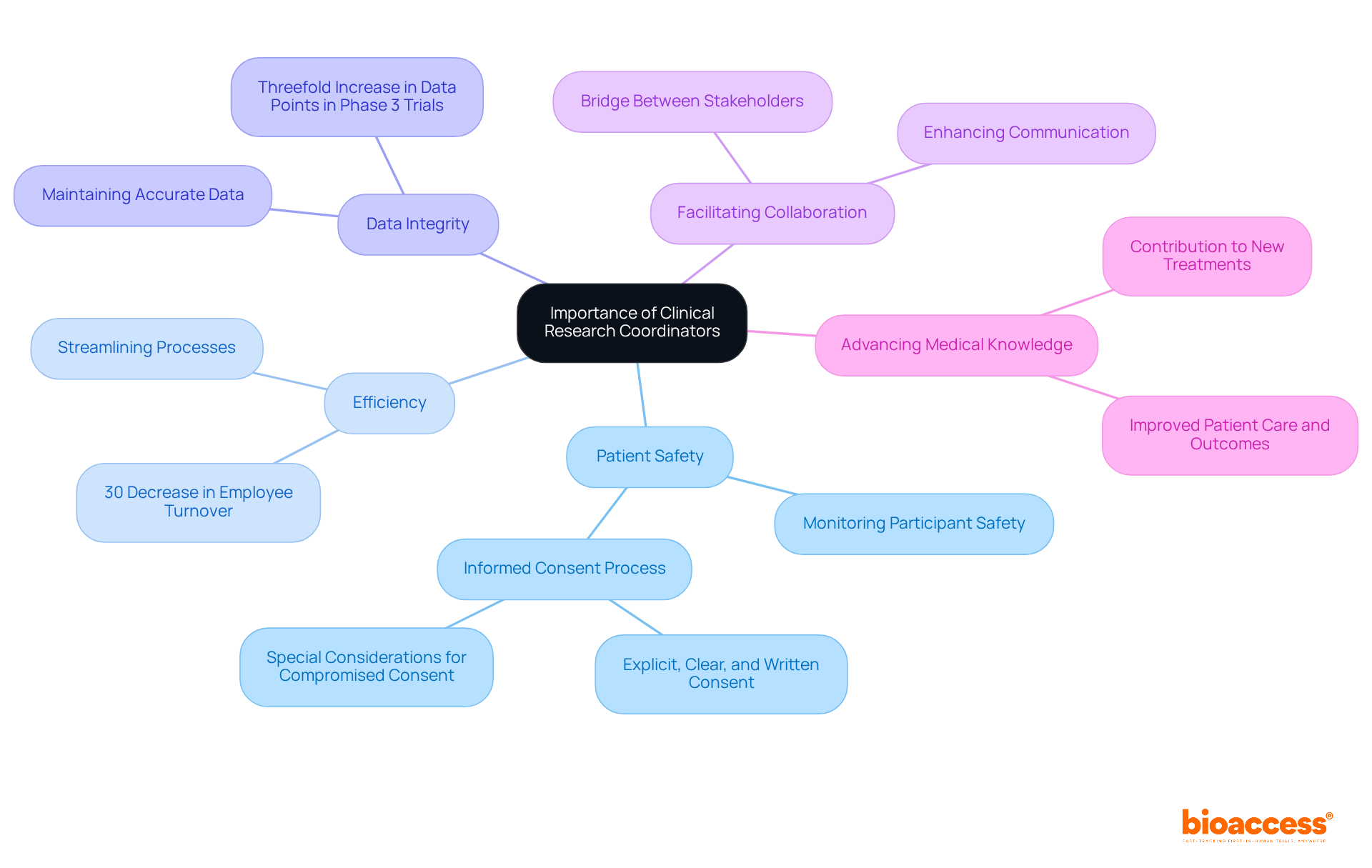


The role of a Clinical Research Coordinator (CRC) in clinical trials is pivotal, as they manage daily operations, ensure compliance with protocols, and facilitate communication among participants, investigators, and regulatory bodies. CRCs significantly enhance trial integrity and efficiency through their critical responsibilities, which include:
This ultimately drives the success of clinical research initiatives, underscoring the necessity of their expertise in navigating the complexities of the Medtech landscape. As the demand for rigorous clinical trials grows, the contributions of CRCs become increasingly vital, positioning them as essential players in the advancement of medical research.
The role of a Clinical Research Coordinator (CRC) is becoming increasingly vital as the complexity of clinical trials escalates. These professionals serve as the linchpin in the intricate web of research, ensuring that studies run smoothly while upholding regulatory standards and participant safety. Readers will explore how CRCs manage everything from participant recruitment to data integrity, ultimately shaping the success of clinical trials. Yet, what challenges do these coordinators face in an environment where efficiency and accuracy are paramount?
The role of clinical research coordinator (CRC) is essential for overseeing the daily operations of clinical trials. Operating under the guidance of the Principal Investigator (PI), the CRC ensures that studies adhere to regulatory requirements and established protocols. They serve as the main connection among participants, investigators, sponsors, and regulatory bodies, enabling smooth communication and coordination throughout the study process. In 2025, the role of clinical research coordinator is highlighted by their contribution to improving trial integrity and success, rendering them essential members of the research team.
Key duties of the role of clinical research coordinator include:
The role of clinical research coordinator is essential in resolving problems that arise during experiments, such as missed appointments or patient issues, thus ensuring that the project progresses seamlessly.
Effective case examples demonstrate the influence of Clinical Research Centers on clinical experiments. For instance, at bioaccess, the role of clinical research coordinator (CRC) is to oversee daily operations at multiple locations, where their organized method to tasks—such as screening participants for studies and recording patient data—maintains study integrity and encourages positive patient experiences. Notably, bioaccess's accelerated patient recruitment services enable trials to enroll participants 50% faster than traditional methods, significantly enhancing overall efficiency. This investment in the role of clinical research coordinator development, which includes continuous training and access to cutting-edge e-clinical technologies, results in outstanding investigative environments and significantly contributes to the progress of medical science.
The significance of clinical research centers goes beyond operational management; they represent the link between scientific investigation and patient care. Their capacity to balance accuracy in research with empathy for patients enhances the overall study experience, ultimately driving the success of clinical research initiatives.

The role of clinical research coordinator (CRC) is crucial in ensuring the success of clinical investigations, as it encompasses a range of duties that guarantee the seamless implementation of projects. Their key responsibilities include:
Participant Recruitment and Screening: CRCs are tasked with identifying and recruiting eligible participants, meticulously ensuring they meet the study's inclusion and exclusion criteria. This is essential, as almost 70% of delays in testing arise from recruitment issues, particularly for Medtech and Biopharma startups contending with competition from established firms.
Informed Consent: A vital aspect of their role involves clarifying the research's purpose, procedures, risks, and benefits to prospective participants. This process not only ensures informed consent but also cultivates trust, as patients frequently value transparent communication regarding their rights and the nature of the study.
Data Management: CRCs are responsible for collecting, managing, and analyzing study data, ensuring accuracy and compliance with regulatory standards. Their collaboration with researchers and data management teams is vital for examining datasets and elucidating findings, which enhances the scientific significance of study results.
Protocol Compliance: Monitoring adherence to study protocols is another essential responsibility. Clinical research centers must make necessary adjustments to maintain compliance and safeguard participant safety, as deviations can lead to significant challenges, including potential study terminations.
Communication: Effective communication is at the heart of a CRC's duties. They facilitate interactions between the Principal Investigator (PI), research sponsors, and regulatory bodies, ensuring that all parties are informed and aligned throughout the research process.
Training and Oversight: Clinical Research Coordinators may also assume the role of training and overseeing other personnel, ensuring that all participants comprehend their responsibilities and the significance of adhering to Good Clinical Practice (GCP) guidelines.
In addition to these responsibilities, the role of clinical research coordinator is essential in the extensive clinical study management services provided by bioaccess, which encompass feasibility studies, site selection, project management, and compliance reviews. By utilizing patient-focused strategies and tackling logistical obstacles, clinical trial centers significantly enhance the overall success of clinical trials, ultimately promoting medical advancement and innovation.

To become a Clinical Research Coordinator (CRC), individuals typically need a solid educational foundation and a diverse skill set that highlights the role of clinical research coordinator.
Educational Background: A bachelor's degree in life sciences, nursing, or a related field is often the minimum requirement for CRC positions. Approximately 73.12% of job postings specify this educational level, while 14.37% require a master's degree. Notably, 60.13% of respondents indicate that a bachelor's degree is needed for the role of clinical research coordinator. Advanced degrees or certifications in clinical studies can significantly improve job opportunities and income potential, with certified CRCs earning 10-20% more than their non-certified counterparts. On average, certified clinical study coordinators can earn between 10-20% more than their non-certified counterparts.
Experience: Prior experience in clinical research or a healthcare setting is highly beneficial, providing practical knowledge of research protocols and patient interactions. Notably, 61.64% of job postings seek candidates with 0 to 2 years of experience, while 33.81% require 3 to 5 years.
Key Skills:
Average Salary by Education Level: The average salary for certified rehabilitation counselors varies significantly based on educational attainment. Those with a bachelor's degree earn approximately $67,054 annually, while those with a master's degree can expect around $111,782. This disparity highlights the importance of educational background in determining salary potential and career advancement opportunities. Furthermore, certified rehabilitation counselors in high-demand regions such as New York and San Francisco receive salaries exceeding the national average because of elevated living expenses.
Job Outlook: Employment in clinical studies is anticipated to increase by 8% from 2021 to 2031, suggesting a favorable job outlook for the role of clinical research coordinator.
Benefits: Community Resource Coordinators often receive comprehensive benefits, including health insurance, retirement plans, and paid time off, contributing to a balanced work-life environment.

The role of clinical research coordinator is pivotal in the success of clinical trials, significantly impacting various aspects of the research process.
Patient Safety: CRCs prioritize participant safety by ensuring that trials adhere to ethical standards and regulatory compliance. They closely monitor participants, addressing any concerns that arise, which is vital for maintaining trust and transparency in the research process. The role of the clinical research coordinator in obtaining explicit, clear, and written informed consent is crucial, especially for participants whose ability to consent may be compromised.
Efficiency: By overseeing the logistics of clinical studies, Clinical Research Coordinators streamline processes, significantly reducing delays and enhancing enrollment rates. Their organizational abilities are crucial in guaranteeing that research proceeds without issues, demonstrating the role of clinical research coordinator in achieving a 30% decrease in employee turnover and improved trial efficiency.
Data Integrity: CRCs are pivotal in maintaining the integrity of study data. Their meticulous attention to detail and strict adherence to protocols ensure that the data collected is accurate and reliable, which is essential for the validity of research findings. The increase in data points gathered in Phase 3 studies emphasizes the significance of the role of clinical research coordinator in ensuring effective data management.
Facilitating Collaboration: Acting as a bridge between various stakeholders—including investigators, sponsors, and regulatory bodies—CRCs enhance communication and collaboration. The role of clinical research coordinator is essential for the overall effectiveness of clinical studies, as it fosters a cohesive environment that supports compliance and quality control.
Advancing Medical Knowledge: By facilitating clinical research, these centers contribute significantly to the advancement of medical knowledge and the development of new treatments. Their efforts ultimately lead to improved patient care and outcomes, reinforcing the importance of the role of clinical research coordinator within the healthcare ecosystem. As the demand for CRCs continues to grow, driven by the increasing complexity of clinical trials, their contributions will be more critical than ever.

The role of a Clinical Research Coordinator (CRC) is fundamental in ensuring the success of clinical trials, acting as the linchpin that connects various stakeholders while upholding the integrity of the research process. As the landscape of clinical trials evolves, the CRC's responsibilities become increasingly critical, particularly in maintaining compliance with regulations and fostering trust among participants. Their contributions not only enhance the efficiency of trials but also significantly impact patient safety and data accuracy.
Throughout the article, key insights have been shared regarding the diverse responsibilities of CRCs, including:
The emphasis on effective communication and problem-solving skills highlights the multifaceted nature of this role, which is vital for navigating the complexities of clinical research. Furthermore, the discussion on educational requirements and the importance of continuous training underscores the need for a well-prepared workforce to meet the demands of an evolving field.
In light of the significant impact that Clinical Research Coordinators have on trial outcomes and patient experiences, it is essential for organizations to invest in their development and recognize their contributions. As the demand for CRCs continues to grow, fostering a deeper understanding of their role will not only enhance clinical trial efficiency but also advance medical knowledge and improve patient care across the healthcare system. Emphasizing the importance of CRCs is crucial for the future of clinical research, ensuring that the bridge between scientific inquiry and patient welfare remains strong and effective.
What is the role of a Clinical Research Coordinator (CRC)?
The Clinical Research Coordinator (CRC) oversees the daily operations of clinical trials, ensuring adherence to regulatory requirements and established protocols under the guidance of the Principal Investigator (PI). They facilitate communication among participants, investigators, sponsors, and regulatory bodies.
What are the key duties of a Clinical Research Coordinator?
Key duties include managing participant enrollment, ensuring informed consent is acquired and recorded, supervising the collection and submission of research data, managing laboratory results, arranging participant appointments, and keeping detailed records of research activities, including adverse event reporting.
How does a Clinical Research Coordinator contribute to clinical trials?
A CRC resolves problems that arise during experiments, such as missed appointments or patient issues, ensuring that the project progresses seamlessly. They maintain study integrity and enhance patient experiences.
What impact do Clinical Research Centers have on clinical experiments?
Clinical Research Centers, through the role of the CRC, oversee operations at multiple locations, maintaining organized task management, which helps in screening participants and recording patient data. They can also enable accelerated patient recruitment, enrolling participants 50% faster than traditional methods.
Why is continuous training important for Clinical Research Coordinators?
Continuous training and access to cutting-edge e-clinical technologies are crucial for the development of CRCs, resulting in outstanding investigative environments and significantly contributing to the progress of medical science.
How do Clinical Research Centers enhance the overall study experience?
They balance accuracy in research with empathy for patients, which enhances the overall study experience and drives the success of clinical research initiatives.